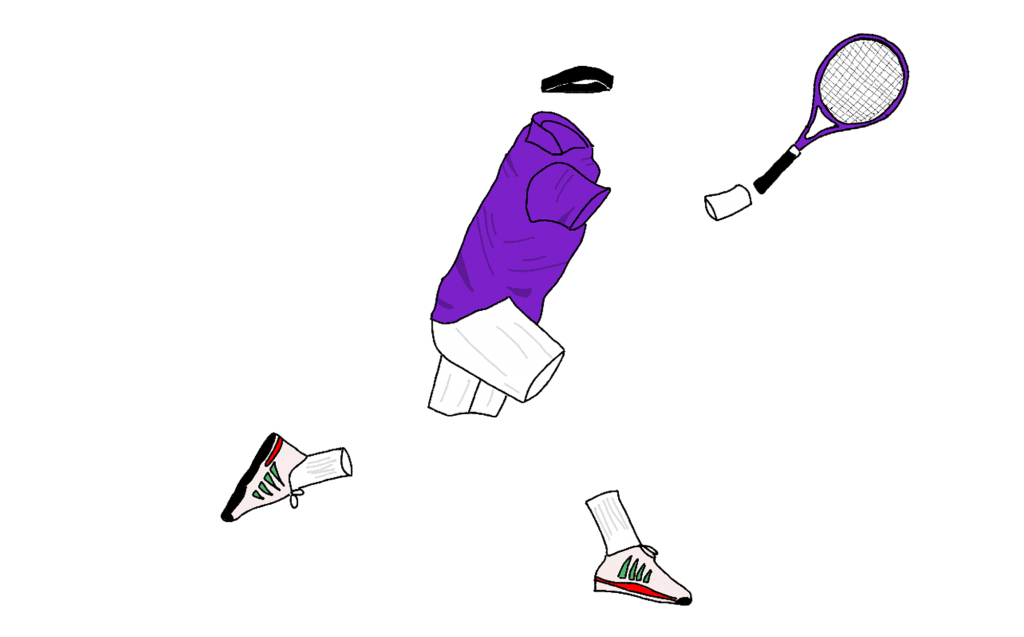Practice makes perfect: analyzing the importance of daily sports practice attendance
Analyzing the importance of daily sports practice attendance
April 11, 2018

Senior Michael Wan spoke in a hurry, questions thrown at him from every direction. A robot had gone missing, and as the director of electrical engineering of the MV Robotics Team, he suddenly found himself in the middle of several interviews from local news stations. He looked at the clock and sighed. These interviews were going far later than expected, and he knew he would miss tennis practice. When the interviews finally stopped, he headed to the tennis court, figuring he could still get to practice a bit. As he approached the courts, several teammates began texting him.
“The coach benched you,” they said.
Wan was angry. Everything seemed like a blur, from the interviews to the abrupt news of him having to sit out the next match. He wasn’t worried, as he knew everything would be sorted out once he explained his situation. With this in mind, Wan drew closer to the coach and clarified what had happened, expecting to be placed back into the game.
His request, however, was denied.
It is tennis coach Gerry Santos’ belief that all sports require daily practice sessions. Without these allotted times, Santos believes an athlete not only loses his discipline and grit, but is also largely unable to hone his skills and improve his performance. He uses this fact as justification for the attendance policy he implemented after becoming the new coach for varsity tennis this year.
Under this policy, all students were to attend practice on a regular basis unless faced with extenuating circumstances, such as injury, sickness or a death in the family. Failure to comply would result in either sitting out of a game or eexpulsion from the team.
“Even before tryouts, I’d always be giving my expectations, and there [was] already some resistance to what was going to be changing for this season,” Santos said. “But I gave them my rationale about it, how tennis shouldn’t be any different from any other after school sport. You should be going to practice. Why would you not be going to practice if you were on the tennis team?”
For Wan, a four-year member of the varsity team, this turnabout delivered a sharp blow. As one of the most experienced players of the team, having to sit out during a game because of one absence seemed a bit ridiculous.
Moreover, he feels that coming to school practice everyday is unnecessary, and that strict attendance policies aren’t directly conducive to better performance during matches. Whether or not one attends practice, Wan feels that the MVHS varsity tennis team will continue dominating the league, as shown by their performance at the Newport All-Star Invitational.
Three-year member of the varsity team senior David Zhang agrees with this sentiment, adding that he feels practice sessions do not teach the players anything of intrinsic value. If anything, Zhang believes that they simply conflict with the players’ individual — and in their words, more valuable — practices, clinics and physical conditioning sessions.
“I have my own training outside of this, so I don’t see school practice as required,” Zhang said. “[The tennis players] have work to do so there’s a bunch of conflict in our lives, just to [go to] practice.”
While Santos recognizes Zhang’s reasoning, he emphasizes that practice sessions are meant for just that — practice. Having received years of coaching with baseline, hitting, volley and overhead drills, Santos feels that the players are equipped with the skills they need to succeed at matches. Whether they do well or not ultimately depends on the amount of practice they get, which is why, during school sessions, he makes it a point to focus on just that.
Santos also highlites that regardless of how effective or useful practices are, it is an athlete’s duty to attend them as it forms the very fabric of positive team dynamics, both between athletes and between the coach and the team.
“Homework and studying are not an excuse to miss practice,” Santos said. “I believe that you should be able to attend practice and maintain your academics. If you can’t, then maybe after school sports is not for you, if you can’t maintain your academics and studying and finding the time for the after school sport.”
Athlete and junior Mythili Ketavarapu, who missed only a few girls varsity soccer practices due to sickness and a prior commitment, similarly believes that being a part of the school team means being at practice everyday, no matter how trying or how conflicting the circumstances may be.
“Commitment to a team is not a choice per se, at least for me,” Ketavarapu said. “Even sometimes when I don’t want to go, I have to because otherwise I can’t really say I’m a part of the team.”
Wan, while recognizing that daily practice is indeed important for team development, believes that the type of commitment displayed by Ketavarapu is not feasible For this reason, he wishes Santos would loosen up his stance regarding attendance, especially since sports like tennis, unlike soccer or basketball, are more individualistic rather than team-based. He explains that in tennis, one does not usually depend on his teammate to win a match — the focus is on the individual and his respective skills.
But athletic director Nick Bonacorsi believes daily practice is important for sports of all types, individual or not.
“From the team perspective first, in all of our team sports, if you have athletes that aren’t attending practice, it has a cancerous impact on the team,” Bonacorsi said. “Whether it be trying to drill plays as a group, whether it be team chemistry or team culture, all those things are negatively impacted when athletes decide not to come [to practice] for various reasons.”
Ketavarapu echoes a similar sentiment, expressing the importance of teammates and team-based practice in individual sports. It is her belief that all members of a team must commit themselves to a greater goal, one that transcends beyond merely individualistic aspirations, in order to truly call themselves a part of a school team.
“If you’re missing practice just because you don’t want to go or you’re feeling lazy or you have too much homework, then you’re putting yourself before others,” Ketavarapu said. “You’re not contributing to your team’s goal, so maybe there’s a part of you that probably doesn’t want to play the sport and wants to quit.”
As the first-year coach of varsity tennis, Santos understands that some may oppose his policies, that they may call him strict. He understands that tennis is a unique sport, in that it is both individual and team-based at the same time, which may contribute to friction in terms of attendance.
However, he requests his players to consider their actions through his viewpoint — all he really wants is for the team to succeed, and for that, daily attendance in practice is necessary.
“You don’t get better by not practicing,” Santos said. “If there’s an injury and people need time off, I give that. You don’t get better sitting down. If you’re going to be a part of the team, it’s not just showing up for the competition — you’ve got to be there at practices, just like I have to be at practices. Just like people on the baseball team have to be at practice, and basketball team. Tennis shouldn’t be any different.”

















